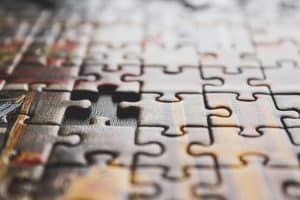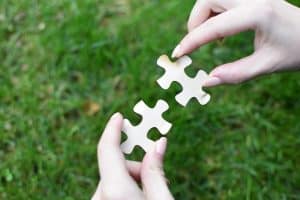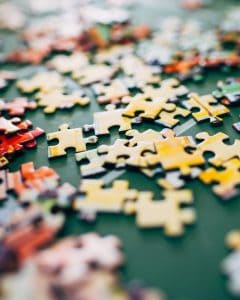Jigsaw puzzles have been a popular pastime for generations, providing entertainment for people of all ages. But aside from their recreational value, many have wondered whether they have any cognitive benefits. Specifically, the question has arisen: Are jigsaw puzzles good for your brain?
Some claim that these puzzles can improve memory, concentration, and problem-solving skills, while others remain skeptical. In this context, it’s worth examining the evidence to see what science has to say about the cognitive benefits, if any, of jigsaw puzzles.
Are Jigsaw Puzzles Good for Your Brain? Let’s Find Out
Many people enjoy working on jigsaw puzzles as a form of relaxation and entertainment, puzzles promote family togetherness but can this simple activity actually have cognitive benefits? While research on the topic is limited, there are some potential advantages to doing jigsaw puzzles that have been suggested by scientific studies and anecdotal evidence.
Jigsaw puzzles naturally induce state of creative, they can improve your visual-spatial reasoning skills. This is the ability to visualize and manipulate objects in your mind, which is important for many everyday tasks such as reading maps, packing a suitcase, or arranging furniture in a room. Assembling jigsaw puzzles require you to use these skills to fit together different shapes and colors, which can help improve your overall visual-spatial abilities.
Another potential benefit of jigsaw puzzles is that they can be a form of mindfulness practice. Focusing on the puzzle and blocking out other distractions can be a form of meditation, which has been shown to have a range of mental and physical health benefits. Engaging in a relaxing activity like jigsaw puzzles can also help reduce stress and anxiety, which can have a positive impact on overall brain health.
Finally, jigsaw puzzles may have some benefits for older adults in particular. Studies have shown that engaging in mentally stimulating activities, such as puzzles or games, can improve fine motor skills, help delay cognitive decline and even reduce the risk of dementia. Doing puzzles may help keep the brain active and engaged, which is especially important as we age.
Overall, while more research is needed to fully understand the cognitive benefits of jigsaw puzzles, there is some evidence to suggest that they can improve visual-spatial reasoning skills, promote relaxation and mindfulness, and potentially even protect against cognitive decline in older adults. So the next time you’re looking for a fun and relaxing activity, consider picking up a jigsaw puzzle and giving your brain a workout!
What Does It Mean if You’re Good at Puzzles?
If you’re good at puzzles, it could mean a few different things.
First, it may mean that you have good visual-spatial reasoning skills. This is the ability to visualize and manipulate objects in your mind, which is important for many types of puzzles, such as jigsaw puzzles, crosswords, and Sudoku. People with strong visual-spatial skills can quickly identify patterns and relationships between different pieces or parts of a puzzle, allowing them to solve it more efficiently.
Additionally, being good at puzzles may indicate that you have strong problem-solving abilities. Puzzles require you to use logic and deduction to find solutions, and people who are skilled at puzzles often have a natural talent for identifying and analyzing problems. They may be able to break down complex challenges into smaller, more manageable parts and then solve each part individually.
Finally, being good at puzzles may simply mean that you have a lot of experience with them. The more puzzles you do, the better you will become at recognizing patterns and finding solutions. So, if you’ve been doing puzzles for a long time and are good at them, it may simply be a reflection of your dedication and practice.
In summary, being good at puzzles may indicate that you have strong visual-spatial reasoning skills, problem-solving abilities, or simply a lot of experience with puzzles. Regardless of the reason, being a person good at puzzles can be a fun and rewarding way to challenge your mind and keep your brain sharp.
Are Jigsaw Puzzles Good for Your Brain? – Bottom Line
The bottom line is that there is evidence to solving jigsaw puzzles and crossword puzzles can be good for your brain in several ways. Completing jigsaw puzzles requires visual-spatial reasoning skills, problem-solving abilities, and can even be a form of mindfulness practice. Engaging in mentally stimulating activities, such as puzzles, has been shown to help delay cognitive decline and reduce the risk of dementia in older adults.
While more research is needed to fully understand the cognitive benefits of jigsaw puzzles, they can be a fun and relaxing way to challenge your mind and keep your brain active and engaged. So, if you enjoy doing jigsaw puzzles, keep at it, as it could be beneficial for your brain health.

